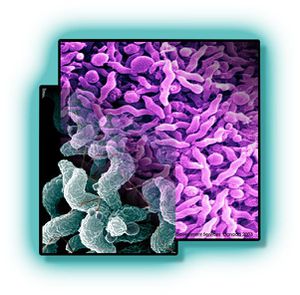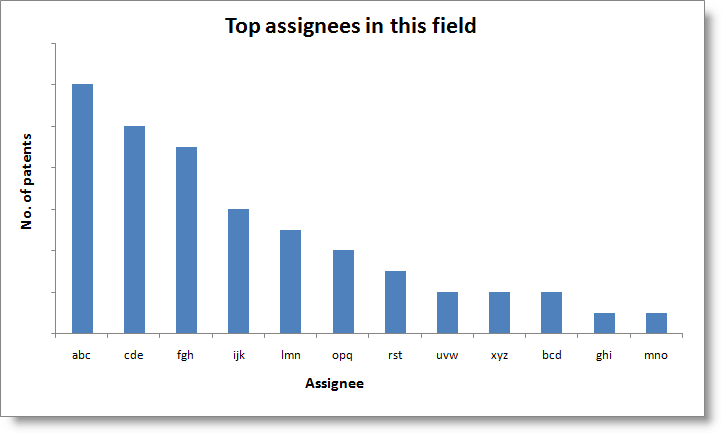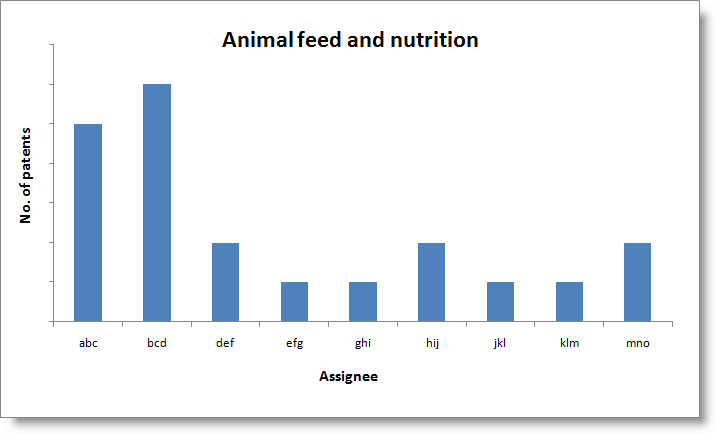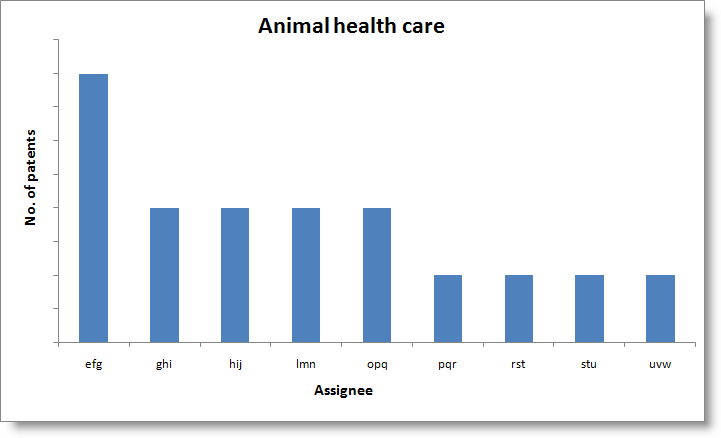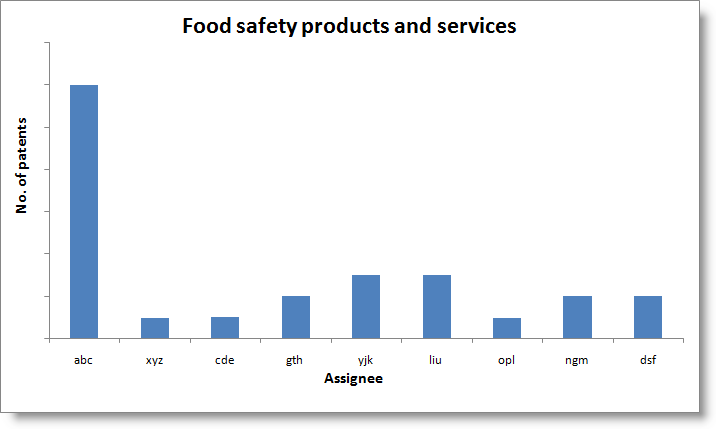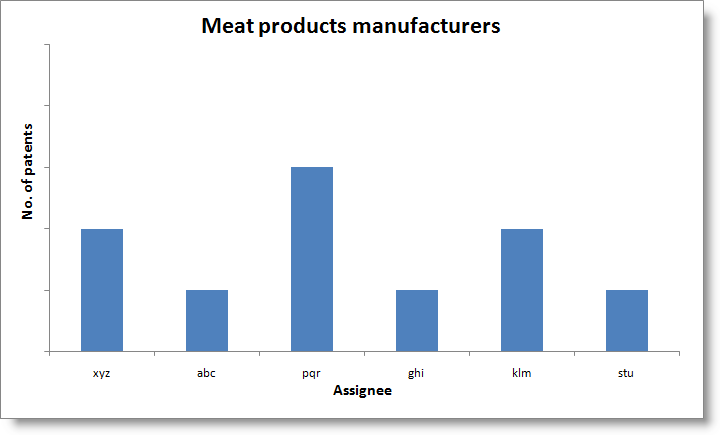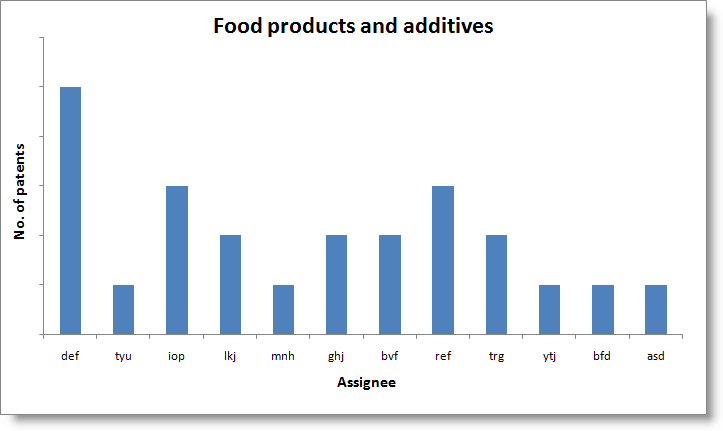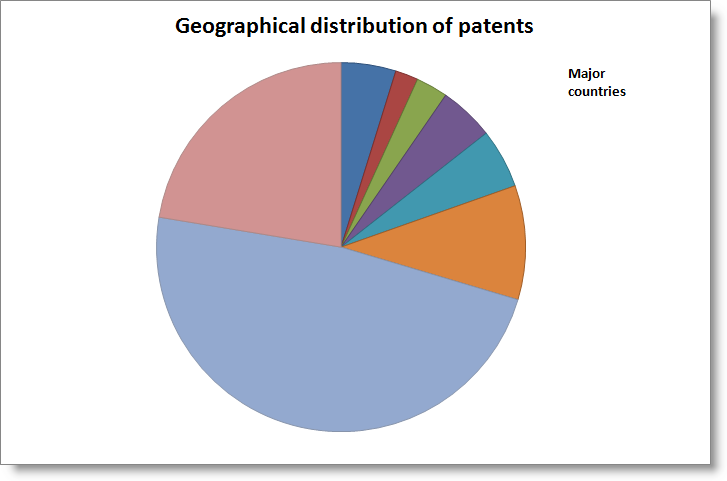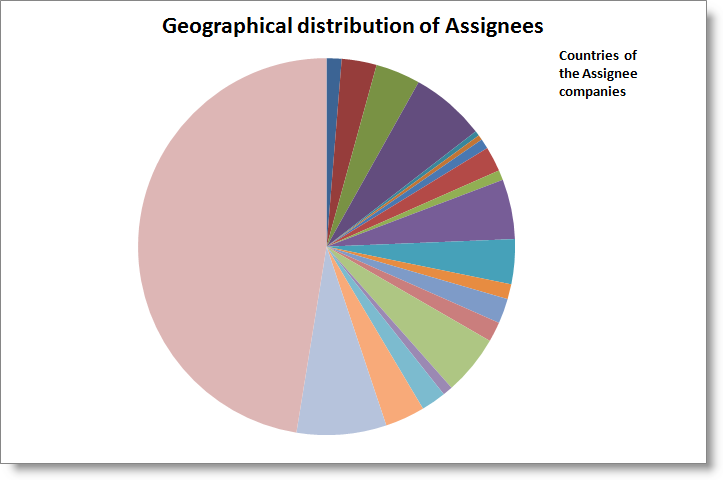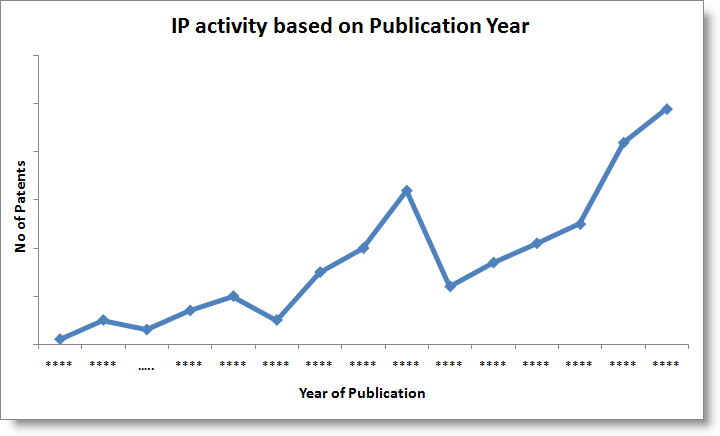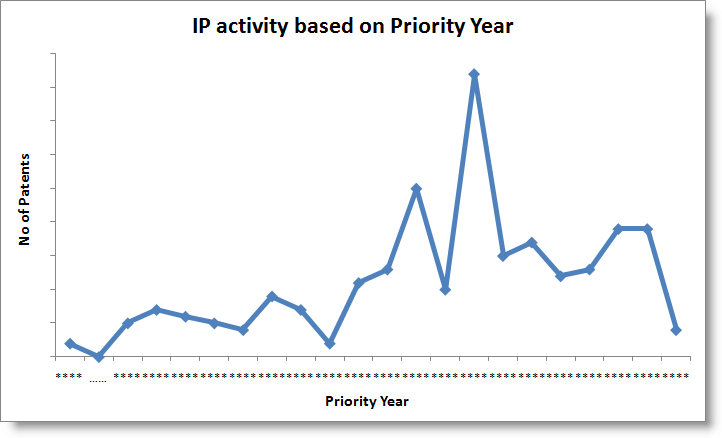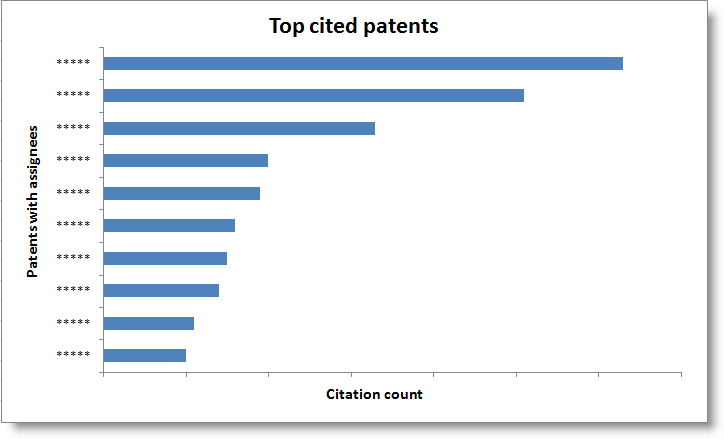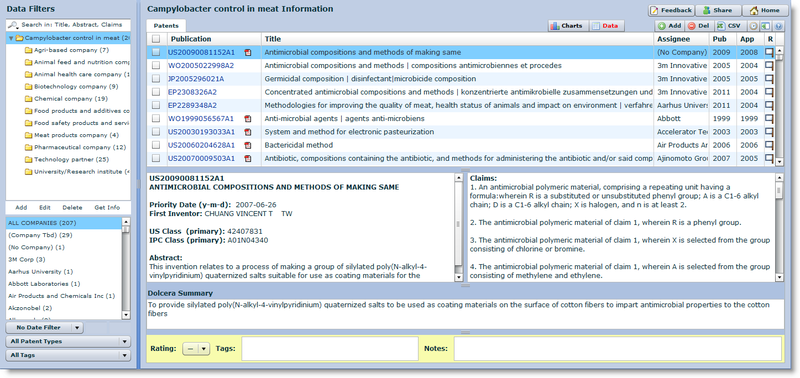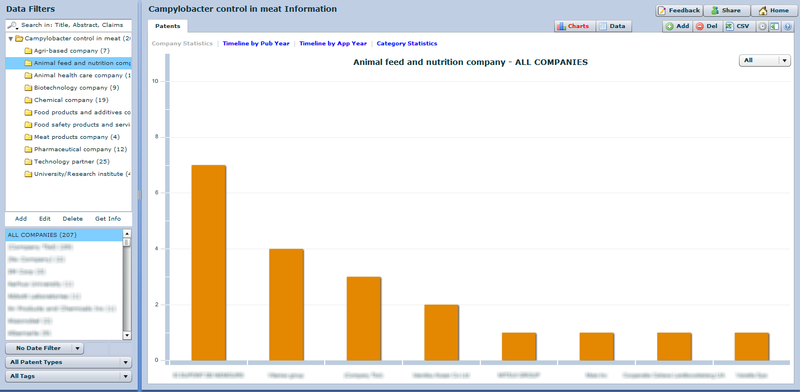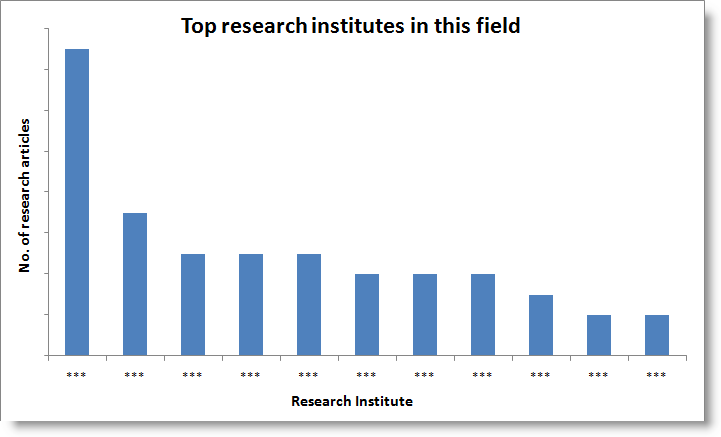Objective
To create a technology landscape report on Campylobacter control in meat
- Identify market players with prolific IP activity in the technology area
- Segment the players by the industry they belong to
Note: This report is just a template and gives an indication of what the paid report contains.
Click here for information to purchase the report
Background
Campylobacter bacteria are a major cause of foodborne diarrhoeal illness (Campylobacteriosis) in humans and are the most common bacteria that cause gastroenteritis worldwide. Campylobacter infections are generally mild, but can be fatal among very young children, elderly and immune-suppressed individuals [WHO] The Campylobacter spp. associated with gastrointestinal illness in humans include C. jejuni, C. coli, C. lari, C. fetus and C. upsaliensis [Food safety and Authority of Ireland]
The bacteria normally inhabit the intestinal tract of warm-blooded animals such as poultry, cattle, pigs, sheep, ostriches and shellfish; and in pets, including cats and dogs. Hence they are frequently detected in foods derived from these animals. Most often, carcasses or meat are contaminated by Campylobacter from faeces during slaughtering. The main route of transmission is generally believed to be foodborne, via undercooked meat and meat products, as well as raw or contaminated milk. Contaminated water or ice is also a source of infection [WHO] Poultry meat is known to be one of the most important sources of Campylobacter for humans. However, Campylobacter colonization in the gut is prevalent in all animals. Campylobacter is mainly a contamination of the surface of the carcass and bovine, ovine and porcine carcasses and can also test positive for Campylobacter immediately after slaughter. Storage (cooling down) of the carcasses under dry air conditions results in the death of Campylobacter and reduced Campylobacter counts after a prolonged time. At retail level, the Campylobacter contamination levels of non-poultry meat are clearly less than the levels in poultry. It is to be expected that red meat contributes to human campylobacteriosis to a much lesser degree than poultry [Wagenaar et al.]
The Campylobacter spp. are sensitive to freezing, heating (pasteurisation/cooking), drying, acidic conditions (pickling), disinfectants and irradiation. They survive poorly at room temperature (21°C) and in general survive better at cooling temperatures. They can grow on moist foods at temperatures between 37°C and 45°C, with an optimum temperature of 42°C. It has been estimated that consumption of a small number of organisms (500 or less) may be associated with illness. Therefore, the fact that the organism does not multiply very effectively in most foods does not prevent it from causing foodborne illness. The organisms normally die quickly in the presence of air and are very sensitive to oxygen breakdown products. Vacuum or gas packaging appears to have little effect on their survival [Food safety and Authority of Ireland]
Strategies aimed at reducing Campylobacter counts on carcasses and raw chicken meat products include
- Improved hygiene during processing
- Freezing of carcasses at processing plants
- Irradiation
- Chemical decontamination of carcasses by chlorine or trisodium phosphate
- Marination of the raw fresh chicken meat
- Spreading of a mixture of dry seasoning compounds on the surface of chicken meat products, etc. [González and Hänninen]
Concept table
| S.No | English Keywords | French Keywords | German Keywords | ||||||
| Campylobacter | Control | Meat | Campylobacter | Control | Meat | Campylobacter | Control | Meat | |
| 1 | Campylobacter, Campylobacteriosis | Control | Meat | Campylobacter , campylobactériose | Contrôle, Contrôle, contrôlée |
Viande, Viandes | Campylobacter, Campylobacteriose | Kontrolle, Steuerung, Regelung, kontrolliert |
Fleisch |
| 2 | ** | *** | *** | ** | *** | *** | ** | *** | *** |
- An indicative list of terms to show how a concept table is generated. View paid report for complete list.
- Concept Table was enriched by searches related to gut biology and probiotics in food from pubmed mesh, relevant patents, scientific articles and various thesauri
Class codes and Definitions
IPC / ECLA Class codes
| CLASS CODE | DEFINITION |
| CLASS CODES RELATED TO MEAT PRESERVATION | |
| A23B0004* | General methods for preserving meat, sausages, fish or fish products |
| A23K000118 | Animal feeding stuffs specially adapted for particular animals |
US Class codes
| CLASS CODE | DEFINITION |
| CLASS CODES RELATED TO MEAT PRESERVATION | |
| 426 | FOOD OR EDIBLE MATERIAL: PROCESSES, COMPOSITIONS, AND PRODUCTS |
| 426332 | Inhibiting chemical or physical change of food by contact with a change inhibiting chemical agent other than an antioxygen agent
|
Relevant F-Terms
| S.No | F-Theme | F-Terms | |
| F-TERMS FOR MEAT PRESERVATION | |||
| 3 | 2B005 | Feed for specific animals | |
| MB00 | SPECIAL ADDITIVES | ||
| MB01 | Antibiotic substances | ||
| MB07 | Medicines | ||
- An indicative list of various class codes used for the IP search. View paid report for complete list.
Search strategy
Search Strategy with English keywords
Database: Thomson Innovation
Timeline: Query: 01/01/1991 - 18/10/2011
Patent Coverage: US, DWPI, FR, WO, EP, JP,CN, KR, DE, GB
| S.No | Concept | Scope | Search string | Type of class codes | Class codes | Number of hits |
| 1 | (Campylobacter*) keyword + (Meat preservation) class codes | Description | Campylobacter* OR **** | Any IPC or ECLA | A23B0004* OR ***** | ### |
| 2 | US class | 426332 OR **** |
### | |||
| 3 | 1 OR 2 | ### | ||||
| 4 | (Campylobacter + Meat) keywords + Class codes of Preservation methods |
Description for Campylobacter keyword Title, Abstract, Claims for Meat keywords |
(Campylobacter*) AND (Meat*1 OR *****) |
Any IPC or ECLA | A01N**** OR ***** |
### |
| 5 | US class | 42*** OR **** | ### | |||
| 6 | 4 OR 5 | #### | ||||
| 7 | (Campylobacter + control) keywords + (Meat processing) class codes | Description for Campylobacter keyword Title, Abstract, Claims for Control keywords |
(Campylobacter*) AND (Control*4 OR ******) |
Any IPC or ECLA | A22B***** OR **** |
### |
| 8 | US class | 42*** OR *** |
## | |||
| 9 | 7 OR 8 | ### | ||||
| 10 | Final English search Query | 3 OR 6 OR 9 | #### (No. of unique hits = ####) | |||
Search Strategy with French keywords
Database: Thomson Innovation
Timeline: Query: 01/01/1991 - 18/10/2011
Patent Coverage: FR, WO, EP
| S.No | Concept | Scope | Search string | IPC or ECLA Class codes | Number of hits |
| 1 | (Campylobacter) keywords + (Meat preservation) class codes | Description | (Campylobacter OR *****) |
A23B0004* OR ****** | ### |
| 2 | (Campylobacter + Meat) keywords + Class codes of Preservation methods |
Description for Campylobacter keywords Title, Abstract, Claims for Meat keywords |
(Campylobacter OR *****) AND (Viande*1 OR *****) |
A01N***** OR ***** |
### |
| 3 | (Campylobacter + control) keywords + (Meat processing) class codes | Description for Campylobacter keywords Title, Abstract, Claims for Control keywords |
(Campylobacter OR ****) AND (contrôle OR ***** ) |
A22B000500 OR A22C* OR A23L0001314 OR A23L0001315 OR A23L0001317 |
### |
| 4 | Final Query | 1 OR 2 OR 3 | ### (No. of unique hits = ###) | ||
Search Strategy with German keywords
Database: Thomson Innovation
Timeline: Query: 01/01/1991 - 18/10/2011
Patent Coverage: DE, WO, EP
| S.No | Concept | Scope | Search string | IPC or ECLA Class codes | Number of hits |
| 1 | (Campylobacter) keyword + (Meat preservation) class codes | Description | (Campylobacter OR ***** ) |
A23B0004* OR **** |
### |
| 2 | (Campylobacter + Meat) keywords + Class codes of Preservation methods |
Description for Campylobacter keywords Title, Abstract, Claims for Meat keywords |
(Campylobacter OR **** ) AND (Fleisch OR ****) |
A01N***** OR **** |
### |
| 3 | (Campylobacter + control) keywords + (Meat processing) class codes | Description for Campylobacter keywords Title, Abstract, Claims for Control keywords |
(Campylobacter OR **** ) AND (Kontrolle OR *****) |
A22B**** OR ***** |
## |
| 4 | Final Query | 1 OR 2 OR 3 | #### (No. of unique hits =####) | ||
Search Strategy with F-terms
Database: Thomson Innovation
Timeline: Query: 01/01/1991 - 18/10/2011
Patent Coverage: JP
| S.No | Concept | Scope | Search string | F Terms | Number of hits |
| 1 | (Campylobacter) keyword + (Meat preservation) F-Terms | Description | Campylobacter* |
2B005**** OR ****** |
## |
| 2 | (Campylobacter + Meat) keywords + Class codes of Preservation methods |
Description for Campylobacter keywords Title, Abstract, Claims for Meat keywords |
(Campylobacter*) AND (Meat*1 OR **** ) |
4H**** OR **** |
### |
| 3 | (Campylobacter + control) keywords + (Meat processing) class codes | Description for Campylobacter keywords Title, Abstract, Claims for Control keywords |
(Campylobacter*) AND (Control*4 OR ***** ) |
4B**** OR **** |
### |
| 4 | Final Query | 1 OR 2 OR 3 | ### (No. of unique hits = ###) | ||
Final search Results
| Query | Search strategy | Number of hits |
| Final Query | English OR French OR German OR Japanese | #### (No. of unique hits = ####; Relavency = ***%) |
Relevant Patents
| S. No | Patent/ Publication no. | Assignee/ Applicant | Year | Title | Focus | Dolcera Summary |
| 1 | US7767240B2 | Albemarle Corporation | 2010 | Microbiological control in poultry processing | Microbiological control | The present invention deals with the preparation of halogen-based antimicrobial derivatives which are highly efficient, cost effective and can be widely used in the poultry processing industry. The microbicidal compound can be applied directly to the poultry carcass, or to the equipments, instruments, apparatus, chiller tanks, etc. used during the processing and is effective against Campylobacter jejuni, Campylobacter coli, Campylobacter lari, etc. |
| 2 | US20090239912A1 | University of Arkansas | 2009 | Concentrated, non-foaming solution of quaternary ammonium compounds and methods of use | Microbiological control | A major challenge in the meat processing industry is to deliver a pathogen-free product to the consumers. The present invention deals with the preparation of compositions containing quaternary ammonium compounds (QAC) which prove effective against a broad spectrum of microorganisms including Campylobacter attached to the surface of meat products. The surface adhering microbes are killed, inactivated or their growth is retarded, making the meat products safe for consumption. |
| 3 | US5494660A | Emory University | 1996 | Method for inhibiting microbial binding to surfaces | Reducing adhesion of microorganisms to surfaces | The present invention deals with the preparation of a biologically active copolymer which is effective in reducing the adhesion of pathogenic microorganisms on the surface. The compound is either given in the form of feed to the poultry birds to reduce the gut population of pathogenic bacteria or applied to the surface of skin or meat from the poultry animals. It is effective against a number of food-borne pathogens including Salmonella, Campylobacter, etc. |
Analysis sheet
Interactive Taxonomy
Taxonomy was populated based on the detailed analysis of patents.
Assignee Analysis and IP activity
- Labels for all the charts below are available in the paid report.
- The following graphs explain the placement of the key players in this technology area.
- Furthermore, the assignees have been categorized based on their commercial technology applications. The following graphs represent the Assignees in major technology areas
- Geographical distribution of Patents
- Geographical distribution of Patents
- The graphs given below explain the IP activity in this technology area over the years.
Top cited patents
Patents with the maximum number of forward citations were determined and the graph shows the top 10 patents with corresponding assignees.
Dolcera Dashboard
A comprehensible result in the form of Dolcera dashboard has been given. Dashboard links the Companies in each category to their patents, hence making an interactive platform for analysis.
A data preview of the dashboard is shown below:
A chart preview of the dashboard is shown below:
Patent - Product mapping
- Some products with respect to this technology area were identified and mapped to the patents from their respective assignees.
| S.No | Patent number | Title | Assignee | Products | Snapshot |
| 1 | EP0999851B1 | Use of an enzyme for the manufacture of an agent for controlling bacterial infection | Danisco | Avizyme® | 
|
| 2 | Porzyme® | 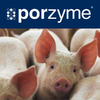
|
Articles search
Search strategy
- Database: Scirus
- Timeline:1991-2012
- Subject Areas:Agricultural and Biological Sciences, Chemistry and Chemical Engineering, Engineering, Energy and Technology, Environmental Sciences, Life Sciences, Medicine, Pharmacology
| S.No | Concept | Search String | No. of hits | |
| 1 | (Campylobacter + Control + meat) keywords | (Campylobacter*) AND (control* OR reduc* OR ****) AND (meat OR mutton OR ****) | #### (Relevancy = ##%) | |
- The following graph explains the placement of different Research Institutes and Universities in this area.
Purchase Information
Contact information for purchasing this report:
- Email: info@dolcera.com
- Phone: +1-650-269-7952 , +91-40-2355-3493
